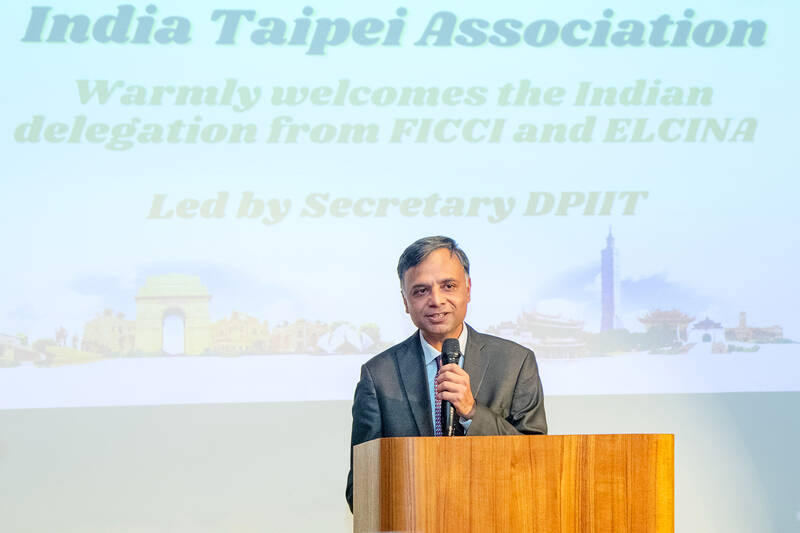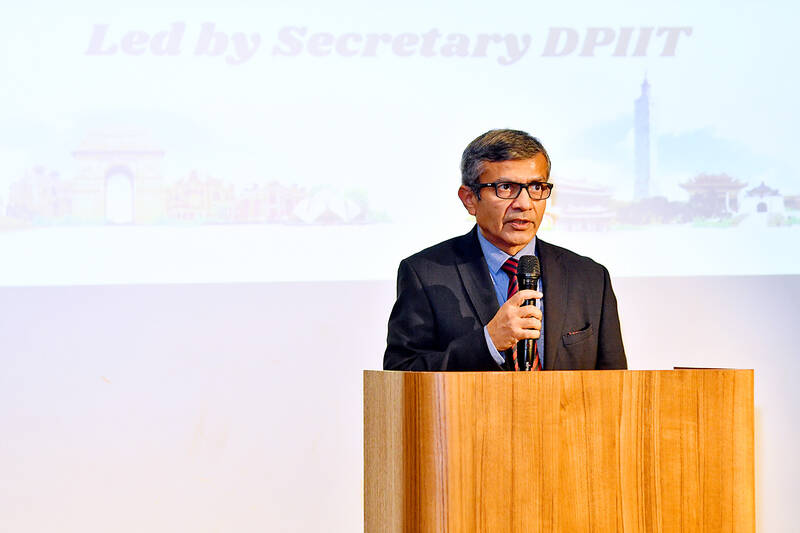India is a favorable destination for Taiwanese manufacturers with a huge market, many young and skilled talent, a pluralistic society with strong rule of law, and credible long-term partnerships, India Taipei Association (ITA) Director-General Manharsinh Laxmanbhai Yadav said yesterday.
Yadav made the remarks at a luncheon with local researchers and reporters at the ITA office in Taipei, joined by Indian Department for Promotion of Industry and Internal Trade (DPIIT) Secretary Rajesh Kumar Singh, who is leading a group of more than 50 Indian delegates visiting Taiwan from Tuesday to tomorrow to deepen economic and people-to-people ties.
The delegation comprises key figures from the Federation of Indian Chambers of Commerce and Industry and Electronic Industries Association of India.

Photo: Lee I-chia, Taipei Times
Singh is the highest-ranking Indian official that has visited Taiwan this year. He took up the post of DPIIT secretary in April, and also serves as the ex officio chairperson of the Indian National Investment Promotion and Facilitation Agency (Invest India) .
During the four-day visit, the delegation is to participate in the second India-Taiwan CEO Roundtable, the seventh India-Taiwan Industrial Collaboration Summit and the 16th India-Taiwan Economic Consultation, and visit the Taipei International Electronics Show (Taitronics).
In addition to meeting with various businesses and industry associations, Singh is to meet with senior officials in key economy-related ministries during his visit.

Photo courtesy of the ITA
“We believe there are many complementarities between India and Taiwan in many ways, and as India moves on to faster growth in industrialization, we feel there is a lot of potential for partnership,” Singh said at the luncheon.
Taiwan’s strengths include hardware, semiconductors and other technologies, while India has the world’s largest and one of the youngest populations — with about 65 percent of working-age people — and a strong and decisive government that provides political and macroeconomic stability, he said.
“As India is on the move, we would love to have Taiwan to be active participants in our growth story,” he added.

Photo courtesy of the ITA
A presentation by Invest India highlighted that in recent years, India has emerged to be the fastest-growing major economy and one of the highest recipients of foreign direct investment, which doubled in the past eight years from about US$35 billion to US$84 billion.
India’s manufacturing GDP is expected to grow by 15 times and services GDP is expected to grow 13-fold in the next 25 years, it said.
The presentation also listed business reforms in India designed to benefit foreign direct investments, including reduced corporate tax, financial incentives for semiconductors and display manufacturers, the National Single Window System, which is a one-stop digital platform for all investor approvals, and ongoing infrastructure developments across the country.
There are three key points that Taiwanese companies prioritize when they want to diversify their business, and India meets these — a huge market with skilled talent, pluralistic democracy and longstanding credible partnerships — so he believes Taiwanese companies would find India to be a good place for their manufacturing business, Yadav said.

Chinese Nationalist Party (KMT) Chairman Eric Chu (朱立倫), spokeswoman Yang Chih-yu (楊智伃) and Legislator Hsieh Lung-chieh (謝龍介) would be summoned by police for questioning for leading an illegal assembly on Thursday evening last week, Minister of the Interior Liu Shyh-fang (劉世芳) said today. The three KMT officials led an assembly outside the Taipei City Prosecutors’ Office, a restricted area where public assembly is not allowed, protesting the questioning of several KMT staff and searches of KMT headquarters and offices in a recall petition forgery case. Chu, Yang and Hsieh are all suspected of contravening the Assembly and Parade Act (集會遊行法) by holding

PRAISE: Japanese visitor Takashi Kubota said the Taiwanese temple architecture images showcased in the AI Art Gallery were the most impressive displays he saw Taiwan does not have an official pavilion at the World Expo in Osaka, Japan, because of its diplomatic predicament, but the government-backed Tech World pavilion is drawing interest with its unique recreations of works by Taiwanese artists. The pavilion features an artificial intelligence (AI)-based art gallery showcasing works of famous Taiwanese artists from the Japanese colonial period using innovative technologies. Among its main simulated displays are Eastern gouache paintings by Chen Chin (陳進), Lin Yu-shan (林玉山) and Kuo Hsueh-hu (郭雪湖), who were the three young Taiwanese painters selected for the East Asian Painting exhibition in 1927. Gouache is a water-based

Taiwan would welcome the return of Honduras as a diplomatic ally if its next president decides to make such a move, Minister of Foreign Affairs Lin Chia-lung (林佳龍) said yesterday. “Of course, we would welcome Honduras if they want to restore diplomatic ties with Taiwan after their elections,” Lin said at a meeting of the legislature’s Foreign Affairs and National Defense Committee, when asked to comment on statements made by two of the three Honduran presidential candidates during the presidential campaign in the Central American country. Taiwan is paying close attention to the region as a whole in the wake of a

OFF-TARGET: More than 30,000 participants were expected to take part in the Games next month, but only 6,550 foreign and 19,400 Taiwanese athletes have registered Taipei city councilors yesterday blasted the organizers of next month’s World Masters Games over sudden timetable and venue changes, which they said have caused thousands of participants to back out of the international sporting event, among other organizational issues. They also cited visa delays and political interference by China as reasons many foreign athletes are requesting refunds for the event, to be held from May 17 to 30. Jointly organized by the Taipei and New Taipei City governments, the games have been rocked by numerous controversies since preparations began in 2020. Taipei City Councilor Lin Yen-feng (林延鳳) said yesterday that new measures by